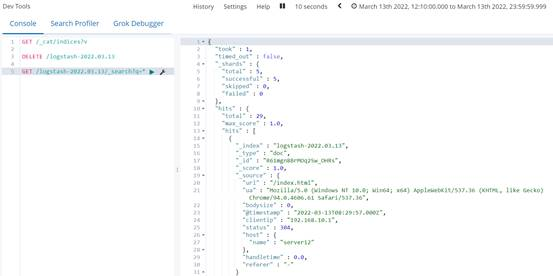Json的好处
1. 原生日志需要做正则匹配,比较麻烦
2. Json格式的日志不需要正则能直接分段采集
Nginx使用Json格式日志
[root@server12 ~]# vim /usr/local/nginx/conf/nginx.conf
log_format json ‘{“@timestamp”:”$time_iso8601”,’
‘“clientip”:”$remote_addr”,’
‘“status”:$status,’
‘“bodysize”:$body_bytes_sent,’
‘“referer”:”$http_referer”,’
‘“ua”:”$http_user_agent”,’
‘“handletime”:$request_time,’
‘“url”:”$uri”}’;
access_log logs/access.log;
access_log logs/access.json.log json;
[root@server12 ~]# nginx -t
nginx: the configuration file /usr/local/nginx/conf/nginx.conf syntax is ok
nginx: configuration file /usr/local/nginx/conf/nginx.conf test is successful
[root@server12 ~]# nginx -s reload
[root@server12 ~]# tail -f /usr/local/nginx/logs/access.log
192.168.10.1 - - [13/Mar/2022:15:35:49 +0800] “GET / HTTP/1.1” 304 0 “-“ “Mozilla/5.0 (Windows NT 10.0; Win64; x64) AppleWebKit/537.36 (KHTML, like Gecko) Chrome/94.0.4606.61 Safari/537.36”
192.168.10.1 - - [13/Mar/2022:15:35:49 +0800] “GET / HTTP/1.1” 304 0 “-“ “Mozilla/5.0 (Windows NT 10.0; Win64; x64) AppleWebKit/537.36 (KHTML, like Gecko) Chrome/94.0.4606.61 Safari/537.36”
192.168.10.1 - - [13/Mar/2022:15:35:49 +0800] “GET / HTTP/1.1” 304 0 “-“ “Mozilla/5.0 (Windows NT 10.0; Win64; x64) AppleWebKit/537.36 (KHTML, like Gecko) Chrome/94.0.4606.61 Safari/537.36”
192.168.10.1 - - [13/Mar/2022:15:35:49 +0800] “GET / HTTP/1.1” 304 0 “-“ “Mozilla/5.0 (Windows NT 10.0; Win64; x64) AppleWebKit/537.36 (KHTML, like Gecko) Chrome/94.0.4606.61 Safari/537.36”
192.168.10.1 - - [13/Mar/2022:15:35:50 +0800] “GET / HTTP/1.1” 304 0 “-“ “Mozilla/5.0 (Windows NT 10.0; Win64; x64) AppleWebKit/537.36 (KHTML, like Gecko) Chrome/94.0.4606.61 Safari/537.36”
192.168.10.1 - - [13/Mar/2022:15:35:50 +0800] “GET / HTTP/1.1” 304 0 “-“ “Mozilla/5.0 (Windows NT 10.0; Win64; x64) AppleWebKit/537.36 (KHTML, like Gecko) Chrome/94.0.4606.61 Safari/537.36”
192.168.10.1 - - [13/Mar/2022:15:35:50 +0800] “GET / HTTP/1.1” 304 0 “-“ “Mozilla/5.0 (Windows NT 10.0; Win64; x64) AppleWebKit/537.36 (KHTML, like Gecko) Chrome/94.0.4606.61 Safari/537.36”
192.168.10.1 - - [13/Mar/2022:15:35:52 +0800] “GET / HTTP/1.1” 304 0 “-“ “Mozilla/5.0 (Windows NT 10.0; Win64; x64) AppleWebKit/537.36 (KHTML, like Gecko) Chrome/94.0.4606.61 Safari/537.36”
192.168.10.1 - - [13/Mar/2022:15:35:52 +0800] “GET / HTTP/1.1” 304 0 “-“ “Mozilla/5.0 (Windows NT 10.0; Win64; x64) AppleWebKit/537.36 (KHTML, like Gecko) Chrome/94.0.4606.61 Safari/537.36”
192.168.10.1 - - [13/Mar/2022:15:35:53 +0800] “GET / HTTP/1.1” 304 0 “-“ “Mozilla/5.0 (Windows NT 10.0; Win64; x64) AppleWebKit/537.36 (KHTML, like Gecko) Chrome/94.0.4606.61 Safari/537.36”
^C
[root@server12 ~]# curl 192.168.10.12
<!DOCTYPE html>
Welcome to nginx!
If you see this page, the nginx web server is successfully installed and
working. Further configuration is required.
For online documentation and support please refer to
nginx.org.
](http://nginx.org/">nginx.org.
)
Commercial support is available at
nginx.com.
Thank you for using nginx.
[root@server12 ~]# ls /usr/local/nginx/logs/
access.json.log access.log error.log nginx.pid
[root@server12 ~]# tail -f /usr/local/nginx/logs/access.json.log
{“@timestamp”:”2022-03-13T15:53:18+08:00”,”clientip”:”192.168.10.12”,”status”:200,”bodysize”:612,”referer”:”-“,”ua”:”curl/7.29.0”,”handletime”:0.000,”url”:”/index.html”}
^C
[root@server12 ~]#
部署服务介绍
3. 192.168.10.11 Kibana ES
4. 192.168.10.12 Logstash Filebeat
Filebeat采集Json格式的日志
[root@server12 ~]# vim /usr/local/filebeat-6.6.0/filebeat.yml
filebeat.inputs:
- type: log
tail_files: true
backoff: “1s”
paths:
- /usr/local/nginx/logs/access.json.log
output:
logstash:
hosts: [“192.168.10.12:5044”]
重启filebeat
[root@server12 ~]# ps aux | grep filebeat
root 8674 0.0 0.9 435920 18300 pts/0 Sl 14:53 0:00 /usr/local/filebeat-6.6.0/filebeat -e -c /usr/local/filebeat-6.6.0/filebeat.yml
root 8968 0.0 0.0 112652 960 pts/0 R+ 15:57 0:00 grep —color=auto filebeat
[root@server12 ~]# kill 8674
[root@server12 ~]# ps aux | grep filebeat
root 8970 0.0 0.0 112652 960 pts/0 R+ 15:57 0:00 grep —color=auto filebeat
[1]+ Done nohup /usr/local/filebeat-6.6.0/filebeat -e -c /usr/local/filebeat-6.6.0/filebeat.yml
[root@server12 ~]# ps aux | grep filebeat
root 8973 0.0 0.0 112652 960 pts/0 R+ 15:57 0:00 grep —color=auto filebeat
[root@server12 ~]# nohup /usr/local/filebeat-6.6.0/filebeat -e -c /usr/local/filebeat-6.6.0/filebeat.yml >> /tmp/filebeat.log &
[1] 8974
[root@server12 ~]# tail -f /tmp/filebeat.log
DELETE /logstash-2022.03.13


刷新nginx页面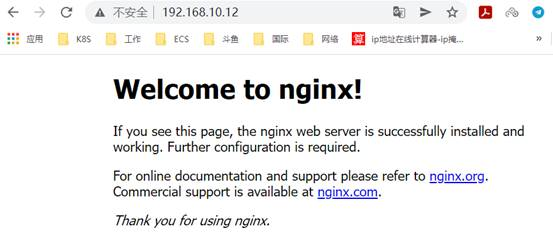
GET /_cat/indices?v
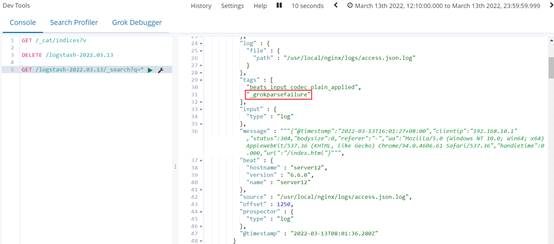
Logstash正则提取的配置备份
filter {
grok {
match => {
“message” => ‘(?
}
remove_field => [“message”,”@version”,”path”,”beat”,”input”,”log”,”offset”,”prospector”,”source”,”tags”]
}
date {
match => [“requesttime”, “dd/MMM/yyyy:HH:mm:ss Z”]
target => “@timestamp”
}
}
Logstash解析Json日志
[root@server12 ~]# vim /usr/local/logstash-6.6.0/config/logstash.conf
input {
beats {
host => ‘0.0.0.0’
port => 5044
}
}
filter {
json {
source => “message”
#remove_field => [“message”,”@version”,”path”,”beat”,”input”,”log”,”offset”,”prospector”,”source”,”tags”]
}
}
output {
elasticsearch {
hosts => [“http://192.168.10.11:9200“]
}
}
DELETE /logstash-2022.03.13
GET /_cat/indices?v
刷新nginx页面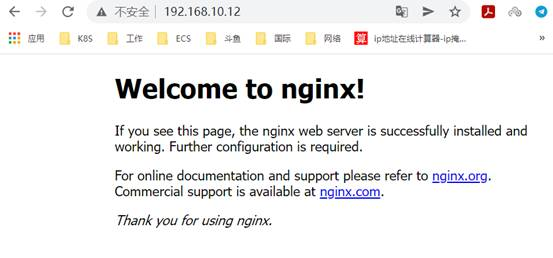
GET /_cat/indices?v
GET /logstash-2022.03.13/_search?q=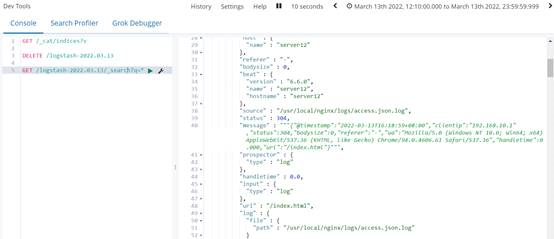
[root@server12 ~]# vim /usr/local/logstash-6.6.0/config/logstash.conf
input {
beats {
host => ‘0.0.0.0’
port => 5044
}
}
filter {
json {
source => “message”
remove_field => [“message”,”@version”,”path”,”beat”,”input”,”log”,”offset”,”prospector”,”source”,”tags”]
}
}
output {
elasticsearch {
hosts => [“http://192.168.10.11:9200“]
}
}
GET /_cat/indices?v
DELETE /logstash-2022.03.13
GET /logstash-2022.03.13/_search?q=
